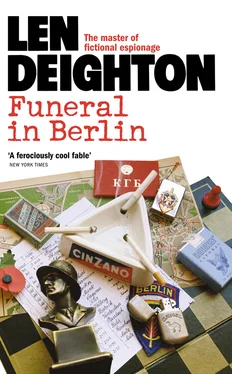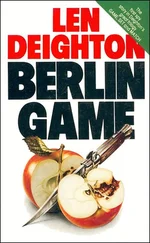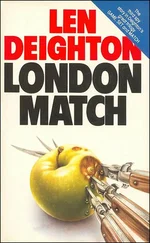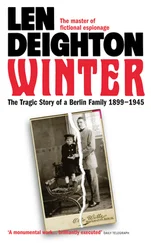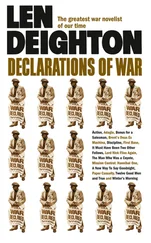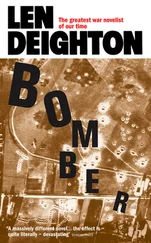‘Train hard, fight easy,’ I said.
‘You quote Marshal Suvarov.’ He walked across to the chessboard and stared at it. ‘In Russia we have a proverb, “Better a clever lie than the foolish truth”.’ He waved his teaspoon at me.
‘There was nothing clever about that clumsy piece of wife-murder.’
‘You’re right,’ said Stok cheerfully. ‘You shall be my friend, English. We must trust each other.’ He put his tea down on the desk top.
‘I’ll never need an enemy,’ I said.
Stok smiled. It was like arguing with a speak-your-weight machine.
‘Truthfully, English,’ he said, ‘I do not want to defect to the West but the offer of Semitsa is a genuine one.’ He sucked the spoon.
‘For money?’ I asked.
‘Yes,’ said Stok. He tapped the fleshy palm of his left hand with the bowl of the spoon.
‘Money here.’ He closed his hand like a vault.
Knights can pass over squares controlled by enemy forces. Knights always end their move on a square of the opposite colour.
Tuesday, October 8th
There was plenty of activity at Checkpoint Charlie. Photoflashes sliced instants from eternity. The pavement shone with water and detergent under the pressmen’s feet. Way down towards Hallesches Tor a US military ambulance flasher sped towards the emergency ward and was all set to change direction to the morgue.
One by one the reporters gunned their VWs and began composing tomorrow’s headlines in their minds. ‘Young Berliner killed in wall crossing’ or ‘Vopos Gun Down Wall-Hopper’ or ‘Bloody Sidewalk Slaying at the Wall’. Or maybe he wouldn’t die.
I waved the insurance papers at the guard box and moved gently through. It’s not far to Hallesches Tor – a district of pimps and brothels – and that’s where I had to go next.
An ill-lit doorway gave on to a steep stone staircase. There were a dozen grey metal post-boxes in the hallway. On one of them it said, ‘Bureau for the rehabilitation of German Prisoners of War from the East’. There were no letters inside. I doubt if there ever had been. I walked up the stairs and pressed a small buzzer. I had a feeling that, even had I not pressed it, the front door would have opened.
‘Yes?’ said a calm young man in a dark-grey flannel suit. I used the words of greeting which London had provided.
‘This way, please,’ said the young man. The first room was like a dentist’s waiting room. There were lots of periodicals, lots of chairs and very little else except a distinct lack of privacy. They left me there for a few moments before they took me inside. I was ushered through the door only to find another door – a steel one – facing me. The second door was locked and I stood nervously in the tiny ‘cupboard’ which was lit by a blinding overhead light. There was a soft whirr and then the steel door moved open.
‘Welcome to the Feldherrnhügel,’ 1 said the calm young man.
It was a large room lit by blue neon tubes that produced a soft hum. There was a bookcase full of files and several pull-down maps hung on the wall. Two long metal tables were crammed with phones of various colours, a TV screen, and a powerful radio receiver. Four young men sat along one table. They were like the man who had opened the door; young, pale, clean-shaven and white-shirted, they might represent the new prosperous Germany but they were also representatives of something rather older. This was a cell of the Gehlen Bureau. 2 From here men were spirited in to the DDR 3 or spirited out. These were the men that the East Germans said were Nazis and the ones that Bonn never talked of at all.
I wasn’t exactly a welcome visitor but I represented a section of the Gehlen Organization income; they gave me coffee.
One of the identical men slid into steel-rimmed spectacles and said, ‘You need us to help you out.’ It had a discreet layer of insult. I sipped the Nescafé.
‘Whatever you need – the answer is, yes we can do it,’ the spectacled one said. He passed me a small jug of cream. ‘What is it that you need done first?’
‘I’m trying to decide between having Dover encircled and Stalingrad subjugated.’
Steel Spectacles and the other two men smiled, perhaps for the first time.
I fed them some Gauloises and then we got down to business.
‘I need something moved,’ I said.
‘Very well,’ said Steel Spectacles. He produced a small tape machine.
‘Place of consignment’s origin?’
‘I’d try to arrange that to your convenience,’ I said.
‘Excellent.’ He clicked the switch on the mike. ‘Origin nul,’ he said.
‘To?’ he asked me.
‘Channel ports,’ I said.
‘Which one?’
‘Any,’ I said. He nodded again and repeated my answer into the tape recorder. We were getting on fine together.
‘Size?’
‘One human,’ I said. No one batted an eyelid; he immediately said, ‘Willing or unwilling?’
‘I’m not sure yet,’ I said.
‘Conscious or unconscious?’
‘Conscious willing or unconscious unwilling.’
‘We prefer conscious,’ said Spectacles before relaying it on to the tape.
The phone rang. Spectacles spoke into the mouthpiece in a rapid series of orders, then two of the Gehlen boys slipped into dark raincoats and hurried for the door.
‘A shooting at the wall,’ Spectacles said to me.
‘No kidding,’ I said.
‘Right at Checkpoint Charlie,’ said Spectacles.
‘One of your boys?’ I asked.
‘Yes, just a courier,’ said Spectacles. He uncupped the phone; the caller was to wait there and phone back if he wasn’t contacted in thirty minutes. He hung up.
‘We are the only people who get anything done here in Berlin,’ Spectacles said. The other man, blond with a large signet ring said, ‘Ja’. Then Spectacles and he nodded to each other.
‘Since Hitler?’ I almost said, but I swallowed the words with a second cup of hot coffee. Spectacles produced a street map and clipped a piece of transparent acetate across the face of it. He began marking circles here and there across the east side of the city.
‘These are the sort of places we favour as jumping-off places,’ he said.
‘Not too near the Sektor boundary and within a mile of the Soviet Zone. Things can heat up very quickly in this burg, especially if you grab someone hot. Sometimes we prefer to put our cargo on ice in the zone somewhere. Anywhere from Lübeck to Leipzig.’ Spectacles had a smooth American accent and here and there it came through his lucid Rhineland German.
‘We will need at least forty-eight hours’ notice,’ said Spectacles. ‘But after that we will be responsible even if we take longer to actually do the movement. Do you have any questions?’
‘Yes,’ I said. ‘What’s the procedure if I want to contact your people and I am in the East?’
‘You phone a Dresden number and they will give you an East Berlin number. It changes every week. The Dresden number changes sometimes too. Check with us before you go over.’
‘OK but does anyone have phones going across the city of Berlin?’
‘Officially one. It connects the Russian Command in Karlshorst with the Allied Command in the Stadion here in West Berlin.’
‘Unofficially?’
‘There have to be lines. The water, electricity, sewage and gas authorities all have lines to speak to their opposite number in the other half of the city. There could be an emergency but they are not officially recognized.’
‘And you don’t ever use these lines?’
‘Very seldom.’ There was a buzz. He flipped a switch on his desk. I heard the voice of the calm young man say, ‘Yes. Good evening,’ and another voice. ‘I’m the man you were expecting from Dresden.’ Spectacles clicked another switch and the TV screen flashed blue. I could see the waiting room as a short man entered it and I saw him enter the brightly lit cupboard. Spectacles swung the TV receiver around so that I couldn’t see it.
Читать дальше
